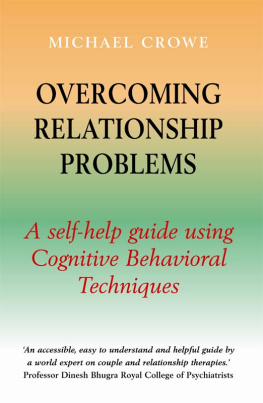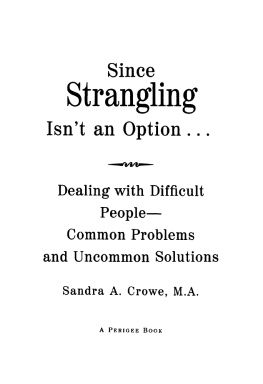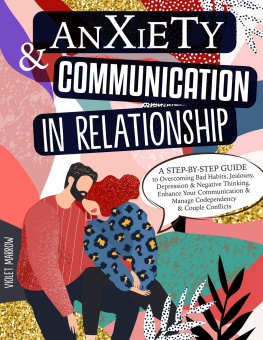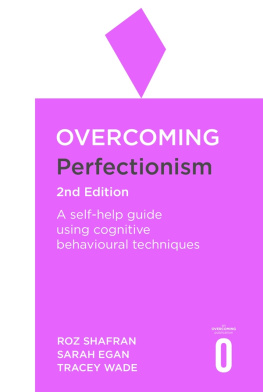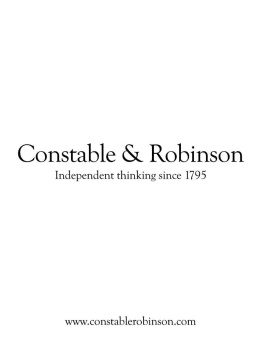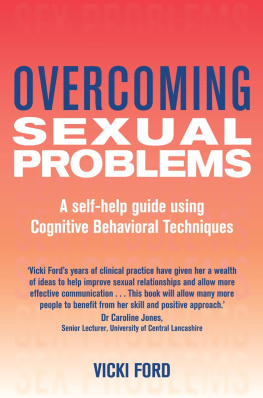MICHAEL CROWE, DM, FRCP, FRC Psych, is a psychiatrist now in private practice. He worked for almost thirty years as a consultant at the Maudsley Hospital, London and was Honorary Senior Lecturer at the Institute of Psychiatry, Kings College, London. He is a founder member of the British Association for Behavioural and Cognitive Psychotherapy and the Institute of Family Therapy in London and is a past chairman of the British Association for Sexual and Relationship Therapy. Michael is the author of a number of books, chapters and academic papers on relationship and sexual problems and continues to help... couples achieve happier, healthier relationships.
The aim of the Overcoming series is to enable people with a range of common problems and disorders to take control of their own recovery program. Each title, with its specially tailored program, is devised by a practising clinician using the latest techniques of cognitive behavioral therapy techniques which have been shown to be highly effective in changing the way people think about themselves and their problems.
The series was initiated in 1993 by Peter Cooper, Professor of Psychology at Reading University and Research Fellow at the University of Cambridge in the UK whose original volume on overcoming Bulimia Nervosa and binge-eating continues to help many people in the USA, the UK and Europe.
Other titles in the series include:
Bulimia Nervosa and Binge-Eating
Overcoming Anxiety
Overcoming Panic
Overcoming Depression
Overcoming Social Anxiety and Shyness
Overcoming Low Self-Esteem
Overcoming Traumatic Stress
Overcoming Childhood Trauma
Overcoming Anorexia Nervosa
Overcoming Mood Swings
Overcoming Anger and Irritability
Overcoming Your Smoking Habit
Overcoming Weight Problems
Overcoming Relationship Problems
Overcoming Chronic Fatigue
Overcoming Obsessive Compulsive Disorder
Overcoming Sexual Problems
Overcoming Chronic Pain
All titles in the series are available by mail order.
Please see the order form at the back of this book.
www.overcoming.co.uk
OVERCOMING
RELATIONSHIP
PROBLEMS
A self-help guide using Cognitive Behavioral Techniques
Michael Crowe
ROBINSON
London
Constable & Robinson Ltd
5556 Russell Square
London WC1B 4HP
www.constablerobinson.com
First published in the UK by Robinson,
an imprint of Constable & Robinson Ltd 2005
Copyright Michael Crowe 2005
The right of Michael Crowe to be identified as the author of this work has been asserted by him in accordance with the Copyright, Designs and Patents Act, 1988.
All rights reserved. This book is sold subject to the condition that it shall not, by way of trade or otherwise, be lent, re-sold, hired out or otherwise circulated in any form of binding or cover other than that in which it is published and without a similar condition including this condition being imposed on the subsequent purchaser.
A copy of the British Library Cataloguing in Publication
Data is available from the British Library.
ISBN 1-84529-066-6
eISBN 978-1-47210-580-6
1 3 5 7 9 10 8 6 4 2
Important Note
This book is not intended to be substitute for medical advice or treatment.
Any person with a condition requiring medical attention should consult a qualified medical practitioner or suitable therapist.
Printed and bound in the EU
Contents
12 Establishing a Relationship
Acknowledgments
I would like to acknowledge my debt to the late Robin Skynner, whose teaching and example was an inspiration to many couple and family therapists, including myself.
I would like to thank Jane Ridley for permission to quote some of her clinical case material in this book. I would also like to thank her and my other colleagues and students at the Maudsley Hospital Couple Therapy Clinics for their enthusiasm and creativity. I would like to express my gratitude to Jack Nathan and Jill Thompson for their careful and helpful reading of the manuscript.
Finally I would like to thank my wife Diane, who has not only put up with me for 37 years, but has also given me much encouragement in the task of writing this book.
Note
The cases I have reported in this book are based on couples seen in therapy, but names and recognizable details have always been changed.
Introduction
Why cognitive behavioral and systemic therapy?
You may have picked up this book uncertain as to why a psychological therapy such as cognitive behavioral and systemic therapy could help you overcome your relationship problems. The first of the two components, cognitive behavior therapy (CBT) was developed initially for the treatment of depression, and the techniques this therapy uses have been found to be extremely effective for a wide range of problems, including compulsive gambling and drug and alcohol addiction. Systemic therapy, the second component, was developed mainly in the context of the treatment of families, particularly those in which there was a child with a psychological problem, and has also been widely used in couple therapy. So what is CBT and how does it work?
In the 1950s and 1960s a set of techniques was developed, collectively termed behavior therapy. These techniques shared two basic features. First, they aimed to remove symptoms (such as anxiety) by dealing with those symptoms themselves, rather than their deep-seated underlying historical causes (traditionally the focus of psychoanalysis, the approach developed by Sigmund Freud and his followers). Second, they were techniques loosely related to what laboratory psychologists were finding out about the mechanisms of learning, which could potentially be put to the test, or had already been proven to be of practical value to sufferers. The area where these techniques proved to be of most value was in the treatment of anxiety disorders, especially specific phobias (such as fear of animals or heights) and agoraphobia, both notoriously difficult to treat using conventional psychotherapies.
After an initial flush of enthusiasm, discontent with behavior therapy grew. There were a number of reasons for this, an important one of which was the fact that behavior therapy did not deal with the internal thoughts which were so obviously central to the distress that patients were experiencing. In particular, behavior therapy proved inadequate when it came to the treatment of depression. In the late 1960s and early 1970s a treatment was developed for depression called cognitive therapy. The pioneer in this enterprise was an American psychiatrist, Professor Aaron T. Beck, who developed a theory of depression which emphasized the importance of peoples depressed styles of thinking. He also specified a new form of therapy. It would not be an exaggeration to say that Becks work has changed the nature of psychotherapy, not just for depression but for a range of psychological problems.
The techniques introduced by Beck have been merged with the techniques developed earlier by the behavior therapists to produce a therapeutic approach which has come to be known as cognitive behavior therapy. This therapy has been subjected to the strictest scientific testing; and it has been found to be a highly successful treatment for a significant proportion of cases of depression. It has now become clear that specific patterns of thinking identified by Beck are associated with a wide range of psychological problems and that the treatments which deal with these styles of thinking are highly effective. So, effective cognitive behavioral treatments have been developed for anxiety disorders, like panic disorder, generalized anxiety disorder, specific phobias and social phobia, obsessive compulsive disorders, and hypochondriasis (health anxiety). They have also been applied to other conditions such as compulsive gambling, alcohol and drug addiction, and eating disorders like bulimia nervosa and binge-eating disorder. Indeed, cognitive behavioral techniques have a wide application beyond the narrow categories of psychological disorders: they have been applied effectively, for example, to helping people with low self-esteem, those with weight problems, those who wish to give up smoking, and, as in this book, those with relationship problems.
Next page
